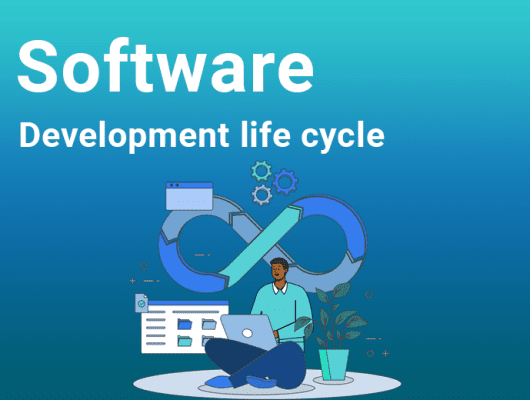
Enterprise mobile app development
Enterprise mobile app development involves creating applications explicitly tailored for businesses and organizations. These apps are designed to enhance productivity, streamline processes, and improve communication within a corporate environment.
They often integrate with existing enterprise systems like CRMs, ERPs, and other databases to provide real-time data access and secure information handling.
But what are the critical challenges in ensuring seamless integration with diverse enterprise systems? How can developers balance usability with stringent security requirements in enterprise app development? What role does user feedback play in iterating and improving enterprise mobile apps over time?
These questions underscore the complexities and considerations in delivering effective solutions for modern businesses. So, let’s find out.
Table of Contents
Understanding Enterprise Mobile App Development

As part of the enterprise mobile app development process, scalable and reliable mobile apps are developed and deployed to assist businesses in carrying out their daily responsibilities. In addition to streamlining corporate processes, they want to provide software that makes it easy for customers, partners, and staff to interact with one another.
Additionally, enterprise mobile development enables large corporations to:
- Increase productivity by automating processes
- Boost efficiency to produce more.
- Effectively manage company data to gain insights
- Encourage effective team communication
- Improve relationships with and satisfaction from customers
- Promote effective teamwork
- Enhance the supply chain and inventory management
- Simplify the procedures for tracking finances, etc.
Most importantly, these apps can serve as the original solution to internal and external problems or replicate the primary services that employees perform on their PCs.
Advantages of Corporate Mobile Applications
The primary driving force behind the incorporation of enterprise mobile apps into business operations is to enhance efficiency, revenue, and collaboration via automation.
There are several key benefits offered by the mobile application industry, such as robust security, seamless portability, and interoperability with other applications and devices.
Let’s delve deeper into each of these advantages.
Automating Repeated Manual Operations
Data entry and report generation are two time-consuming and tiresome procedures that enterprise mobile applications can automate. This can boost productivity and reduce errors, allowing you to focus more on strategic tasks and long-term goals.
Improved Supply Chain Management
Access to real-time data on stock levels, order progress, and delivery schedules can assist companies in refining their supply chain operations.
This level of transparency reduces errors and delays, thereby improving your order completion process.
Efficient Employee Onboarding Process
Business applications for human resources simplify the onboarding process for new employees by automating several necessary procedures. The HR department can save time and resources while enhancing the onboarding process for new hires by utilizing corporate mobile apps that offer self-service choices and convenient access to crucial organization information and training materials.
Streamlined Data Management
Mobile applications for businesses can mechanize tasks and manual data input, reducing the chances of human mistakes, enhancing efficiency, and making data management more straightforward.
They provide staff with instant access to information through a unified platform for collecting, storing, and examining data. They facilitate easier data sharing, enhancing productivity and accelerating issue resolution. Hence, organizations can make justifiable decisions using current information if they have access to precise and timely reports.
Reduced Paperwork
Applications reduce paperwork by streamlining processes and offering digital versions of forms and documents that can be completed and electronically signed.
Besides boosting efficiency, they aid companies in minimizing human mistakes and decreasing paper usage.
Improved Customer Experience
Firms across all industries can elevate customer contentment by providing immediate access to product information, straightforward purchasing, and prompt support. This can strengthen loyalty and cultivate stronger relationships with clients.
Smooth Communication
Mobile apps for businesses can enhance communication between staff members, departments, and clients. Consequently, companies can communicate more effectively, resolve issues more quickly, and deliver superior services.
Enhanced Responsiveness
Enterprise mobile apps can boost responsiveness by offering instant alerts and notifications, enabling employees to respond swiftly to customer inquiries or issues. With this support, companies can reduce downtime and enhance customer contentment.
Varieties of Business Mobile Applications

Enterprise mobile applications are software solutions that help companies reduce costs and improve customer service.
Provided that workers have internet or data connectivity on their mobile gadgets, they can increase their productivity from any location.
Hence, we will now explore the various commercial mobile applications available in the market today.
- Marketing automation: This application allows text marketers to strategize and time their messages. Mobile apps for marketing automation help in tracking partner or employee activities and improving customer service.
- Enterprise resource planning: It assists in formulating a strategy for the workforce, enabling them to perform their tasks swiftly and efficiently.
- Customer relationship management: This tool allows businesses to generate reports and maintain customer service records. It enables the rapid modification of existing plans or systems.
- Automated billing: This simplifies the process for companies to invoice their customers. It aids in managing multiple bills and billing, which helps in keeping track of transactions.
- Message and collaboration system: It provides employees with the tools they need to work more effectively and supports file exchange, communication, and task monitoring.
- Email Marketing Platform: This utility aids businesses in dispatching emails and messages to their customers based on timing and geographical location.
- Integrated mobile workforce: This pertains to advanced software integrated with mobile devices and apps. It enables employees to access necessary information, irrespective of their place or time.
- HR management: It monitors workers’ performance and offers comments. The daily duties and overarching objectives of the HR team are handled through HR management software. The department functions more effectively and achieves superior results when monotonous tasks are mechanized and collaboration is promoted.
- Customer-oriented applications: These applications enhance the user experience by providing easy access to customer data, order processing, and support services. Examples are apps for food ordering and delivery, retail shopping, and mobile banking.
- On-site Service Applications: These apps aim to boost the efficiency of field service staff by offering instant access to client information, schedules, and service records. Applications for planning maintenance and inspections are a couple of examples.
- Apps for Marketing Automation: Utilize these applications to simplify marketing tasks such as customer categorization, managing campaigns, and generating leads. This includes software for email marketing and managing social media.
- Applications for CRM (Customer Relationship Management): These tools facilitate better customer interaction and relationship management. Two instances include applications for sales force automation and customer service portals.
- Apps for supply chain management (SCM): These apps help to oversee the complete supply chain workflow, from purchasing to delivery.
- Collaboration Apps: These apps enhance communication and teamwork between staff members, departments, and partners.
- Apps for Financial Management: Use these to effectively manage financial tasks, including payroll, budgeting, and accounting. Two instances can be tax preparation and cost management applications.
Top Trends in Enterprise Mobile Application Development
Despite the constant emergence of new trends in the dynamic realm of enterprise application development, we have chosen the following as some of the most notable trends in enterprise mobile application development, based on comprehensive and evidence-based research:
AI/ML (artificial intelligence and machine learning):
These technologies significantly improve user experiences across various business sectors, such as marketing, operations, finance, and human resources. They allow chatbots to provide better customer care, personalized content, and task automation to increase operational efficiency.
Blockchain Technology:
In industries like banking and healthcare, blockchain strengthens data security and transparency in developing corporate mobile apps. By securing data sharing and transactions in mobile apps, it improves trust and safety.
Accepting the Metaverse:
The idea of the Metaverse is becoming increasingly popular in the creation of enterprise mobile applications, providing customers and staff with more immersive experiences. Users can conveniently utilize multiple services in a single place and transition between different experiences.
Virtual reality (VR) and augmented reality (AR) technology
It combines to produce engaging and dynamic business mobile apps. These apps are ideal for illustrating concepts, facilitating distant teamwork, and providing education, thereby enhancing user efficiency and involvement.
Low-Code and No-Code Development:
These platforms make mobile app development more straightforward and accessible to non-technical consumers. Due to this tendency, novel concepts can be launched into the market at a faster pace and with reduced development duration.
Key Factors to Consider for Enterprise App Development
A number of elements must be carefully considered to guarantee the success of enterprise software development. It’s crucial to carefully consider all relevant issues that may impact the enterprise mobile application’s functionality, scalability, integration, security, user experience, and other elements listed below to determine how to create one that will meet user needs.
Scalability Requirements Specific to the Enterprise
Because enterprise mobile apps have a large customer and staff base, they frequently have to meet strict scalability requirements. Mobile apps must accommodate additional users while preserving performance as the company grows.
Microservices architecture and cloud-based infrastructure ensure that the enterprise mobile app can handle massive volumes of data effectively. Scalability can also be improved using orchestration and containerization technologies like Kubernetes, which dynamically allocate resources based on demand.
Essential Integrations
Improving a business application with several intricate features is crucial. However, creating these features from scratch is a laborious process that takes time and money.
Fortunately, integrating third-party services via an API-driven approach is a workable method for smoothly incorporating these features into the application. This makes seamless interfaces with databases, third-party services, and current systems possible.
Complex Roles and Permissions for Users
Complex user roles and permissions are necessary for enterprise apps to manage user privileges efficiently, guarantee secure access to critical data and functionality, and uphold regulatory compliance.
To address this, you can utilize identity and access management (IAM) systems, such as OpenID Connect or OAuth, making it easier to set up specific roles and permissions for users inside business mobile apps.
Use of Technologies
Technologies like JSON Web Tokens (JWT) also provide a safe means for permission and authentication. Moreover, attribute-based access control (ABAC) guarantees adherence to complex organizational frameworks and regulatory mandates by providing detailed control over user access based on distinct attributes or situational data.
High Degree of Flexibility in Reporting and Analytics
Enterprise apps may quickly obtain insights into performance, trends, and improvement areas with reporting and analytics, which facilitates strategic planning and well-informed decision-making.
To process big datasets quickly and obtain relevant insights in real-time, users must be able to integrate with Firebase Analytics or MixPanel.
Companies can also leverage tools for data visualization, such as D3.js or Plotly, to improve how analytical results are presented and help people make sense of complex data.
Adding machine learning (ML) algorithms and predictive analytics models to foresee trends and make proactive decisions based on data-driven insights would also be a powerful option for this aim.
Compliance and Data Security
Employing end-to-end encryption methods, such as Transport Layer Security (TLS), to secure data transmission between the enterprise mobile app and backend servers is essential to protecting sensitive information and complying with regulatory requirements. Using data anonymization strategies like differential privacy can also help safeguard private information while preserving the usefulness of the data for analytical reasons.
Intuitive UI/UX
Smart UI/UX design increases user happiness and competitiveness in enterprise mobile applications. Developers employ Kotlin, Compose Multiplatform, or Flutter for cross-platform development to give a native-like user experience while ensuring the design is contemporary and intuitive.
Moreover, In order to offer consistent user experiences across all devices and screen sizes, the app should also adhere to responsive design standards. Motions and animations should be used to increase interactivity and engagement using technologies like Framer Motion or Lottie.
Conclusion
As more companies embrace digital transformation, enterprises need mobile apps more than ever. Establishing the goal, target market, and platform capabilities of your enterprise mobile app development process is the first step if you also intend to construct a strategy.
After that, you can specify its requirements to determine its scope. Prototyping and design will come next, giving you a template for more enterprise mobile development. This entails creating backend services, integrating various components, and putting user interface features into practice. Comprehensive security, compatibility, and operation testing are necessary to guarantee the app’s quality.
You might also want to investigate adding serverless architecture, AI/ML, VR or AR, and IoT functionality to your application. These technologies can improve its capabilities and make it more competitive in the market.
Given how complicated developing an enterprise mobile app is there is also a need for a reputable development company. So, if you require any assistance, feel free to contact Onyxtec.
FAQ
What distinguishes an enterprise app from a regular app?
While corporate applications cater to an organization’s partners, customers, or employees, standard apps are intended for the general public and offer amusement or valuable features.
Enterprise applications simplify company operations and interact with current systems to improve efficiency and promote collaboration, whereas regular apps concentrate on a broader range of features.
Which five stages make up the development of an application?
The five steps in application development are as follows:
- Exploration phases
- Design
- Development
- Testing & deployment,
- Maintenance & updates.




